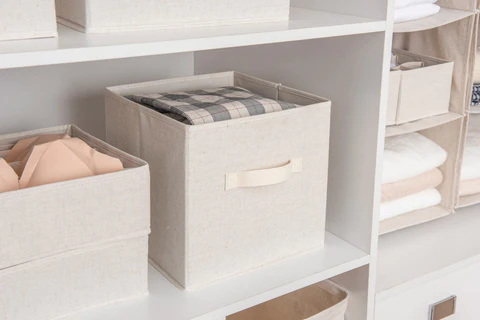Are you tired of cluttered spaces and disorganized belongings? Look no further than storage boxes! These versatile containers come in a variety of materials and sizes, making them perfect for any storage need. From plastic to cardboard to fabric, there is a storage box for every situation. In this blog, we will explore the different types of storage boxes and their uses, as well as tips for organizing your belongings and maximizing your storage space. Say goodbye to clutter and hello to a more organized life with the help of storage boxes!
Here are some common types of storage boxes:
- Plastic storage boxes: Plastic storage boxes are typically made of materials such as polyethylene or polypropylene, and are durable, lightweight, and waterproof. They are suitable for use in homes, offices, and industries.
- Cardboard boxes: Cardboard boxes are typically made of cardboard and are suitable for packaging and transporting items. They are lightweight and customizable.
- Wooden storage boxes: Wooden storage boxes are typically made of solid wood or engineered wood, and are suitable for use in homes and offices. They are aesthetically pleasing and durable.
- Metal storage boxes: Metal storage boxes are typically made of steel or aluminum, and are suitable for use in industries and businesses. They are durable and fire-resistant.
- Fabric storage boxes: Fabric storage boxes are typically made of materials such as cotton, linen, or nylon, and are suitable for use in homesHere are some common types of storage boxes.
Each type of storage box has its own suitable scenarios and characteristics, and should be chosen according to actual needs.
Plastic storage boxes are widely used in various industries and households for storage and organization purposes. Here are some common usage scenarios and pros and cons of plastic storage boxes:
Usage Scenarios:
- Home organization: Plastic storage boxes are commonly used for organizing items in homes, such as clothing, toys, and seasonal decorations.
- Office storage: Plastic storage boxes are also used for storing and organizing documents, office supplies, and equipment.
- Industrial storage: Many industries, such as manufacturing and logistics, use plastic storage boxes for storing and transporting goods.
Pros:
- Durable: Plastic storage boxes are durable and can withstand wear and tear, making them suitable for long-term use.
- Lightweight: Plastic storage boxes are lightweight, making them easy to handle and transport.
- Waterproof: Plastic storage boxes are waterproof, which protects the contents from moisture and humidity.
- Stackable: Plastic storage boxes are stackable, which saves space and makes them easy to store.
Cons:
- Not eco-friendly: Plastic storage boxes are not biodegradable and can contribute to environmental pollution.
- Limited temperature range: Plastic storage boxes have a limited temperature range and may not be suitable for extreme temperatures.
- Limited customization: Plastic storage boxes are not as customizable as other materials, such as cardboard or wood.
- Can be brittle: Some types of plastic storage boxes can be brittle and prone to cracking or breaking.
Overall, plastic storage boxes are a versatile and durable storage option for various industries and households, but their environmental impact and limited customization should be considered when selecting them for specific applications.
%20(1).jpg)
Paper boxes, also known as cardboard boxes, are widely used in various industries for packaging and transportation purposes. Here are some common usage scenarios and pros and cons of paper boxes:
Usage Scenarios:
- Shipping and transportation of goods: Paper boxes are commonly used for shipping and transporting goods due to their lightweight and durable nature.
- Storage and organization: Paper boxes are also used for storage and organization of items in homes, offices, and warehouses.
- Retail packaging: Many retail products are packaged in paper boxes due to their cost-effectiveness and ability to be customized with branding and design.
Pros:
- Lightweight: Paper boxes are lightweight, making them easy to handle and transport.
- Cost-effective: Paper boxes are relatively inexpensive compared to other packaging materials.
- Customizable: Paper boxes can be easily customized with branding and design to enhance product visibility and appeal.
- Recyclable: Paper boxes are recyclable, making them an eco-friendly packaging option.
Cons:
- Limited durability: Paper boxes are not as durable as other packaging materials, such as plastic or metal.
- Susceptible to moisture: Paper boxes can be easily damaged by moisture, which can compromise the integrity of the packaging and the product inside.
- Limited weight capacity: Paper boxes have a limited weight capacity, which may not be suitable for heavy or bulky items.
Overall, paper boxes are a versatile and cost-effective packaging option for various industries, but their durability and weight capacity should be considered when selecting them for specific applications.
Wooden storage boxes are a popular choice for both home and office storage needs. Here are some common usage scenarios and pros and cons of wooden storage boxes:
Usage Scenarios:
- Home storage: Wooden storage boxes are perfect for storing items such as clothing, books, and toys in bedrooms, living rooms, and playrooms.
- Office storage: Wooden storage boxes can be used to store files, office supplies, and other items in a professional setting.
- Decorative storage: Wooden storage boxes can also be used as decorative pieces in homes and offices, adding a rustic or vintage touch to the decor.
Pros:
- Aesthetically pleasing: Wooden storage boxes are visually appealing and can add a touch of warmth and elegance to any space.
- Durable: Wooden storage boxes are sturdy and can withstand wear and tear, making them a long-lasting storage solution.
- Customizable: Wooden storage boxes can be painted, stained, or decorated to match any decor or personal style.
Cons:
- Heavy: Wooden storage boxes can be heavy and difficult to move, especially when filled with heavy items.
- Vulnerable to moisture: Wooden storage boxes can be susceptible to moisture damage, which can cause warping or rotting.
- Expensive: Wooden storage boxes can be more expensive than other types of storage boxes, especially if they are made of high-quality wood.
Overall, wooden storage boxes are a versatile and attractive storage solution that can be used in a variety of settings. However, they may not be the best choice for those who need lightweight or moisture-resistant storage options.
.jpg)
Metal storage boxes are a popular choice for both home and industrial storage needs. Here are some common usage scenarios and pros and cons of metal storage boxes:
Usage Scenarios:
- Industrial storage: Metal storage boxes are commonly used in factories, warehouses, and other industrial settings to store tools, equipment, and other heavy-duty items.
- Garage storage: Metal storage boxes are ideal for storing automotive tools, spare parts, and other items in garages and workshops.
- Home storage: Metal storage boxes can also be used in homes to store items such as seasonal decorations, sports equipment, and gardening tools.
Pros:
- Durable: Metal storage boxes are strong and durable, making them ideal for storing heavy items and withstanding wear and tear.
- Secure: Metal storage boxes can be locked, providing added security for valuable items.
- Fire-resistant: Metal storage boxes are fire-resistant, making them a safe storage option for flammable items.
Cons:
- Heavy: Metal storage boxes can be heavy and difficult to move, especially when filled with heavy items.
- Vulnerable to rust: Metal storage boxes can be susceptible to rust and corrosion, especially if they are not properly maintained.
- Noisy: Metal storage boxes can be noisy when items are moved around inside them, which can be a nuisance in quiet environments.
Overall, metal storage boxes are a durable and secure storage solution that can be used in a variety of settings. However, they may not be the best choice for those who need lightweight or rust-resistant storage options.

Fabric storage boxes are a popular choice for home storage needs. Here are some common usage scenarios and pros and cons of fabric storage boxes:
Usage Scenarios:
- Closet storage: Fabric storage boxes are perfect for storing clothing, shoes, and accessories in closets and wardrobes.
- Nursery storage: Fabric storage boxes are ideal for storing baby clothes, toys, and other items in nurseries and playrooms.
- Home office storage: Fabric storage boxes can be used to store files, office supplies, and other items in a home office.
Pros:
- Lightweight: Fabric storage boxes are lightweight and easy to move, making them a convenient storage option.
- Versatile: Fabric storage boxes come in a variety of sizes, colors, and patterns, making them a versatile storage solution that can match any decor.
- Collapsible: Fabric storage boxes can be collapsed and stored when not in use, saving space.
Cons:
- Not as durable: Fabric storage boxes are not as durable as other types of storage boxes and can be susceptible to wear and tear.
- Not as secure: Fabric storage boxes are not as secure as metal or plastic storage boxes and can be easily opened.
- Vulnerable to moisture: Fabric storage boxes can be susceptible to moisture damage, which can cause mold and mildew.
Overall, fabric storage boxes are a lightweight and versatile storage solution that can be used in a variety of settings. However, they may not be the best choice for those who need durable or moisture-resistant storage options.
In conclusion, storage boxes are an essential item for any home or office. They provide a convenient and organized way to store and access items, while also helping to keep spaces clutter-free. Whether you choose plastic, fabric, or glass storage boxes, it's important to consider your specific needs and usage scenarios before making a purchase. By doing so, you can ensure that you select the best storage boxes for your needs and enjoy a more organized and efficient space. So, start exploring your options today and find the perfect storage boxes for your home or office!
Diana Mason
Hi there! I’m Diana Mason, the chief editor of Patiowell brand. With over 15 years of diving deep into the world of outdoor furniture, I’ve developed a keen eye for what makes outdoor spaces truly special. I love sharing tips and inspiration to help you create your perfect backyard retreat. Our blog is a reflection of my passion and expertise, featuring only the best pieces that I personally vouch for. Thanks for stopping by—I can't wait to help you transform your outdoor living space!









Leave a comment
All comments are moderated before being published.
This site is protected by hCaptcha and the hCaptcha Privacy Policy and Terms of Service apply.